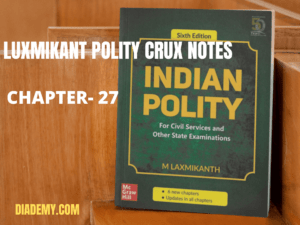
Judicial Review
| Introduction | · The doctrine of judicial review originated and developed in the USA.
· 1803 case: Marbury v. Madison by John Marshall, the then chief justice of the American · Supreme Court. · Indian constitution confers the power of judicial review upon the SC and HCs. · SC has declared JR to be a basic feature of the constitution. · In India – Const. provides under article (13, 32, 226, 131, 132, 133, 134, 135, 136, 143, 227, 245, 246, 251, 254, 372) |
| Imp | · To uphold the principal of supremacy of Constitution.
· Federal Equilibrium Fundamental Right. |
| Scope | · Infringes Fundamental Rights (Part III)
· Repugnant to the constitutional provisions · Competence of the Authority. |
| MEANING OF JUDICIAL REVIEW | · Judicial review is the power of the judiciary to examine the constitutionality of legislative enactments and executive orders of both the Central and State governments.
· Can declare orders/enactments found to be ultra-wires as illegal and invalid. |
| Categories of JR | According to Justice Syed Shah Mohamed Quadri:
· JR of constitutional amendments. · JR of legislations · JR of Administrative actions. |
| Narrower than America | · Due process of law
· SC – third chamber/super Legislature arbiter of social policy |
| Judicial Review of 9th Schedule | 31 (B) – save the act from judicial Review
1st CA, 1951 – + 9th schedule
IR Cohelo Case:Can conduct JR for all acts in the 9th Schedule added after 24/04/1973 – Possible if the violate art 14, 15, 19, 21 |
Get all essential Crux notes by clicking here https://diademy.com/product/staticcrux/